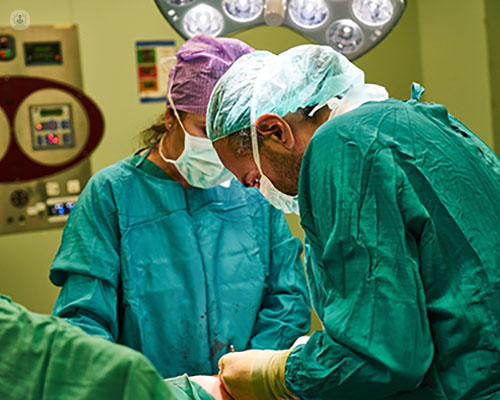Mastering prostate health
Written by:Prostate health is a critical aspect of overall well-being, and when surgical intervention is required, many individuals seek the latest advancements in medical technology. One such breakthrough is minimally invasive surgery for the prostate, offering a revolutionary alternative to traditional open surgery. In his latest online article, Mr Ammar Alanbuki explores the nuances of this cutting-edge approach, its benefits, techniques, potential risks, recovery process, and long-term results.

Understanding minimally invasive surgery for the prostate:
Minimally invasive surgery for the prostate involves utilising advanced technology and innovative techniques to address prostate issues with precision. Unlike traditional open surgery, which requires large incisions, minimally invasive procedures rely on small incisions or natural body openings, reducing trauma to surrounding tissues.
Key benefits and advantages:
The advantages of minimally invasive surgery for the prostate are multifaceted. Patients experience less blood loss, reduced pain, and a shorter hospital stay compared to traditional open surgery. Additionally, the smaller incisions contribute to quicker recovery times and less scarring.
Exploring minimally invasive surgical techniques:
Various minimally invasive techniques are employed for prostate procedures. Laparoscopic surgery uses small incisions to insert a camera and surgical tools. Robot-assisted surgery utilises robotic systems controlled by surgeons, providing enhanced precision. Transurethral procedures involve instruments inserted through the urethra, eliminating the need for external incisions.
Potential risks and complications:
While minimally invasive surgery offers numerous benefits, it is crucial to be aware of potential risks and complications. Potential complications may involve issues such as infection, bleeding, or harm to nearby structures. However, the overall risk profile is generally lower than that of traditional open surgery.
Recovery process and expected outcomes:
The recovery process following minimally invasive surgery for the prostate is often quicker than with traditional methods. Patients typically experience less pain and discomfort, allowing them to resume normal activities sooner. The timeline for regaining urinary and sexual function varies but is generally faster than with open surgery. Most patients can expect a gradual improvement in these functions over several weeks.
Long-term results and success rates:
Long-term results and success rates of minimally invasive surgery for the prostate are encouraging. Studies have shown that patients often experience sustained improvements in urinary and sexual function. The reduced risk of complications and faster recovery contribute to higher patient satisfaction and overall success rates.
Mr Ammar Alanbuki is an esteemed urologist. You can schedule an appointment with Mr Alanbuki on his Top Doctors profile.


